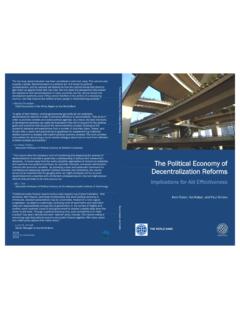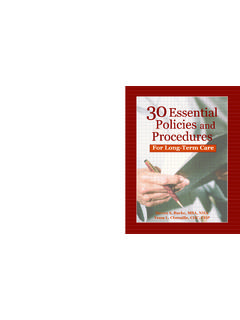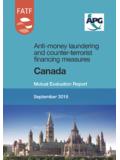Transcription of Reviews of National Policies for Education : Reviews of ...
1 Higher Education in EgyptReviews of National Policies for EducationReviews of National Policies for EducationHigher Education in EgyptThe full text of this book is available on line via this link: with access to all OECD books on line should use this link: is the OECD online library of books, periodicals and statistical databases. For more information about this award-winning service and free trials ask your librarian, or write to us at of National Policies for EducationHigher Education in EgyptIn recent years, the Government of Egypt has driven major reforms for modernising the country. While the success of this effort depends heavily on the quality of Education and skills of the population, Egypt s higher Education system has remained largely unchanged in this context. Without a fundamental reform of the sector the country will face difficulties in improving its competitiveness in an increasingly knowledge-based world, in providing for a larger and more diverse student population, and in reducing social book represents an independent review of Egypt s higher Education system and focuses on areas in need of attention by policy makers and stakeholders, including system steering and institutional governance; student access to higher Education ; educational quality and effectiveness; research, development and innovation; and finance.
2 It contains an analysis of the system and valuable recommendations which, taken together, represent a major programme of structural and cultural reform of Egyptian higher Education over the decade to of National Policies for Education : Higher Education in Egypt will be of interest to Egyptian policy makers and Education professionals, as well as others involved in Education policy and :HSTCQE=U\\WXW:iSbN 978-92-64-07723-2 91 2010 02 1 of National Policies for EducationHigher Educationin EgyptORGANISATION FOR ECONOMIC CO-OPERATION AND DEVELOPMENTThe OECD is a unique forum where the governments of 30 democracies work togetherto address the economic, social and environmental challenges of globalisation. The OECD isalso at the forefront of efforts to understand and to help governments respond to newdevelopments and concerns, such as corporate governance, the information economy andthe challenges of an ageing population.
3 The Organisation provides a setting wheregovernments can compare policy experiences, seek answers to common problems, identifygood practice and work to co-ordinate domestic and international OECD member countries are: Australia, Austria, Belgium, Canada, the CzechRepublic, Denmark, Finland, France, Germany, Greece, Hungary, Iceland, Ireland, Italy,Japan, Korea, Luxembourg, Mexico, the Netherlands, New Zealand, Norway, Poland,Portugal, the Slovak Republic, Spain, Sweden, Switzerland, Turkey, the United Kingdomand the United States. The Commission of the European Communities takes part in thework of the Publishing disseminates widely the results of the Organisation s statisticsgathering and research on economic, social and environmental issues, as well as theconventions, guidelines and standards agreed by its 978-92-64-07723-2 (print)ISBN 978-92-64-08434-6 (PDF)DOI : Reviews of National Policies for EducationISSN 1563-4914 (print)ISSN 1990-0198 (online)Also available in Arabic.
4 Corrigenda to OECD publications may be found on line at: OECD and the International Bank Reconstruction and Development/The World Bank, can copy, download or print OECD content for your own use, and you can include excerpts from OECD publications,databases and multimedia products in your own documents, presentations, blogs, websites and teaching materials,provided that suitable acknowledgment of OECD as source and copyright owner is given. All requests for public orcommercial use and translation rights should be submitted to Requests for permission to photocopyportions of this material for public or commercial use shall be addressed directly to the Copyright Clearance Center(CCC) at or the Centre fran ais d'exploitation du droit de copie (CFC) World Bank is one of the world's largest sources of funding and knowledge fordeveloping countries.
5 The World Bank is not a bank in the common sense, but a group of 5development institutions, owned by 185 member countries, playing a different butcollaborative role to help developing countries reduce poverty, increase economic growth andimprove their quality of particular, the International Bank for Reconstruction and Development (IBRD) focuseson middle income and creditworthy poor countries, while the International DevelopmentAssociation (IDA) focuses on the poorest countries in the world. Together they provide lowinterest loans, interest-free credits and grants in support of Education , health, publicadministration, infrastructure, financial and private sector development, agriculture, andenvironmental and natural resource management. Since its establishment IDA has providedcredits and grants totaling $161 billion.
6 In fiscal year 2008, IBRD provided loans equivalentto $ billion and IDA credits equivalent to $ work is published on the responsibility of the Secretary-General of the OECD. Theopinions expressed and arguments employed herein do not necessarily reflect the officialviews of the Organisation, the Executive Directors of the International Bank forReconstruction and Development/The World Bank, or of the governments they 3 HIGHER Education IN EGYPT OECD AND IBRD/THE WORLD BANK 2010 Foreword For some years now Egypt has been undertaking far-reaching reforms for increasing the competitiveness of the country and making it attractive for foreign direct investment. Aware that the success of this endeavour depends largely on the Education and skills of the population, the Government of Egypt invited the OECD and the World Bank to jointly conduct an independent review of the higher Education system and to formulate options for immediate and longer term Policies towards developing its human capital.
7 The examiners report recognises the reform efforts already invested, but it also recommends paying particular attention to the immediate need for structural reforms, for more flexibility and efficiency in governance and institutional management, and for increasing the capacity of the higher Education system to deliver relevant Education to a broader range of students. If not addressed in a timely manner, these challenges will impede the development of Egypt s full potential to serve the needs of the country. The examiners report was prepared against a comprehensive background report provided by the Egyptian authorities. The review was undertaken within the Programme of Work of the OECD Directorate for Education Programme for Co-operation with Non-Member Economies in partnership with World Bank Human Development Department of the Middle East and North Africa Region.
8 The review was financed by the Government of Egypt and the World Bank with an in kind contribution from the European Training Foundation. Members of the review team were: Michael Gallagher (Australia), Rapporteur, Executive Director of the Go8 Australian Universities; Jos Joaquin Brunner (Chile) Director, Center for Comparative Education Policy, and UNESCO Chair for Comparative Higher Education Policies , Universidad Diego Portales, Chile; Elena Carrero-Perez (Spain), Country Manager for Egypt at the European Training Foundation (ETF); Ahmed Dewidar (Egypt) President, Validity for Research, Evaluation and Quality Assurance Programs; Eva Egron-Polak (Canada), Secretary-General, International Association of Universities (IAU).
9 Francisco Marmolejo 4 FOREWORD HIGHER Education IN EGYPT OECD AND IBRD/THE WORLD BANK 2010 (Mexico), Executive Director, Consortium for North American Higher Education Collaboration (CONAHEC) and Vice President for Western Hemispheric Programs at University of Arizona; Aims McGuinness (United States), Senior Associate, National Center for Higher Education Management Systems (NCHEMS); Sam Mikhail (Canada), Professor Emeritus, Ryerson University, Toronto; Ian Whitman (OECD Secretariat), Head of Programme for Co-operation with Non Member Economies; Ernesto Cuadra (World Bank), Lead Education Specialist, Middle East and North Africa Region; and Jamil Salmi (World Bank), Tertiary Education Co-ordinator.
10 Overall support and co-ordination was provided by Mihaylo Milovanovitch and Deborah Fernandez from the OECD Secretariat and Rasha Sharaf (Egypt), Director, Strategic Planning Unit, Ministry of Higher Education , Egypt. Barbara Ischinger Lau Jorgensen Director for Education Director Human Development OECD MNA World Bank TABLE OF CONTENTS 5 HIGHER Education IN EGYPT OECD AND IBRD/THE WORLD BANK 2010 Table of Contents Acronyms .. 9 Executive Summary .. 13 Chapter 1. 43 Purpose and scope of the exercise .. 43 Request from Egypt and Terms of Reference .. 44 Country Background Report.












![National Water Act [No. 36 of 1998] - Department Of Energy](/cache/preview/a/6/8/e/8/1/4/b/thumb-a68e814b4d9bccc74f62a3a6b561e382.jpg)



